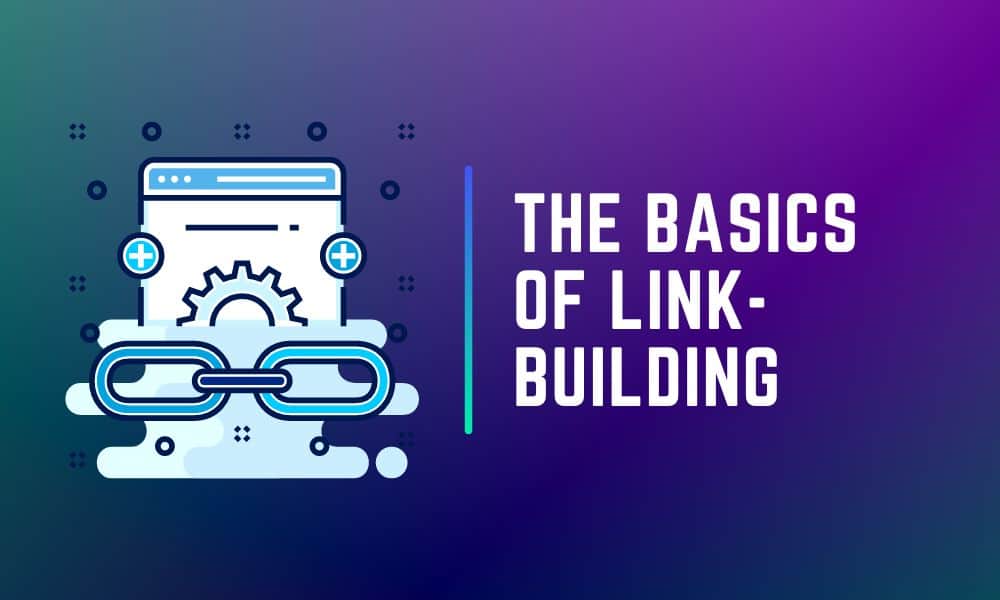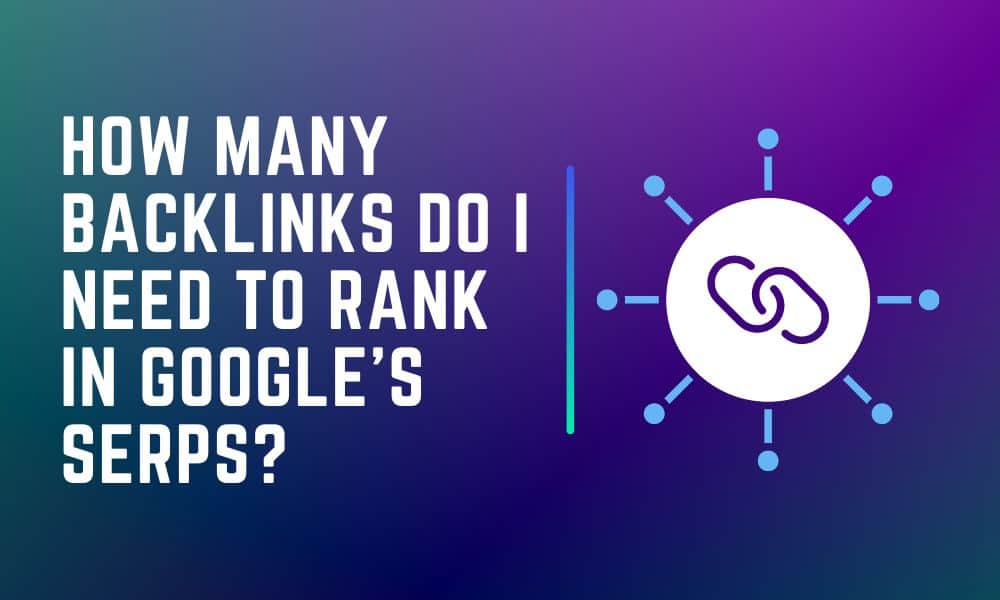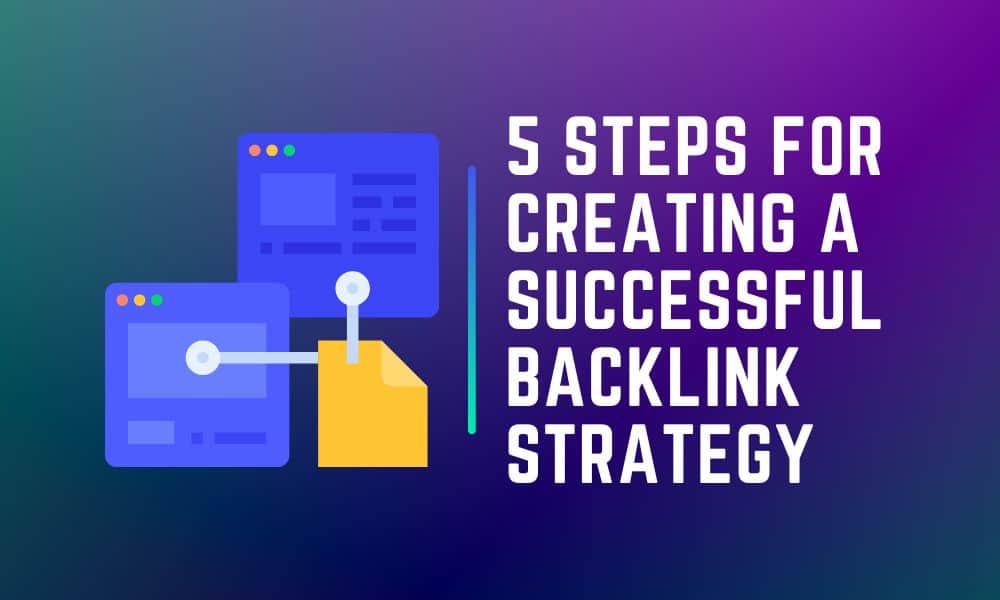Have you asked yourself, “how many backlinks do I need to rank on page 1 of Google’s search engine results pages (SERPs)?” If so, you’re not alone. It’s a frequently asked question of my clients, so I decided to write down my thoughts on the subject.

Before diving in, I will first talk about link-building fundamentals. Links are still one of the key ranking factors that Google and other search engines use to consider how to rank websites.
Link building is acquiring links from other websites to your own. It is a technique in SEO that improves your ranking in the SERPS and page authority.
There are different strategies for building links. And it’s crucial to approach link-building with a long-term, sustainable approach. Common link-building techniques include creating high-quality content that other websites will want to link to and guest posting on other websites, like pages with infographics or results from insightful research.
In fact, websites with many high-quality backlinks will rank higher than pages with few backlinks. The websites on the first page of Google have an average of 3.8x more backlinks than pages 2 to 10.
However, it’s worth noting that not all backlinks are created equal. Search engines place more value on backlinks from reputable and relevant websites. It means it’s essential to focus on building high-quality, natural links rather than trying to game the system by acquiring many low-quality links.
According to Brian Dean (backlinko.com), the first position in Google’s organic search results typically has a CTR of 27.6%. And on competitive keywords, it’s extremely hard (if not impossible) to get that first position without backlinks. So, building links is crucial to expose your content and brand to a bigger audience because it helps you generate leads and sales for your business.
For instance, you own an online clothing store and write a post on your website about a new line of streetwear that you have just released. By using link-building techniques (which we’ll discuss below), a popular industry news site links to your post on its website.
The link to your website is now visible to those who follow, read and trust this news site. People can find out more about your brand when they click on it.
But you must also ensure that those backlinks are heading to the correct pages on your website. Not all of your backlinks should lead to your homepage. Google uses the number of clicks a link gets to decide its importance. When an outbound link receives more clicks, Google will consider the link has value.
Backlinks indicate to search engines that people trust the content shown on your website. They function as votes of confidence that your site is valuable and relevant to the users. As a result, your page deserves to be at the top of the search engine results pages.
Here are some lists that link-building can help your SEO strategy:
Link equity is mainly known as “link juice.” It means the value and authority passed on from a site when they link to your page. Then, Google and other search engines use the value as a ranking factor to decide where a website should be in search results.
Building links is one of the main factors ranking in search engines, but not all links are equal. For instance, acquiring a backlink from Forbes will be much more valuable to your website than one from a recently constructed website. It is better to have one high-quality back than 50 low-quality backlinks that add no value to your SEO metrics.
You should acquire a “do-follow” link from a trusted and relevant to your industry because it will pass “link juice” and boost your domain authority.

The short answer is: one more qualitative backlink than your competitors. The long answer: it depends on many factors of the link itself. Let’s dig in:
A backlink gap is a difference between the quality and quantity of external links your competitors have and the links you already have. In search engine optimization (SEO), analyzing the backlink gap between your website and your competitors can be a helpful way to identify opportunities for improving your backlink profile.
When figuring out the link gap, you should count links from valuable sites, not from other sites with low Domain Authority (DR).
One way to calculate the number of backlinks you need is to analyze the backlink profiles of your top competitors. It can give you the minimum number of backlinks you’ll need to compete with them in the SERPs.
You’ll need to use a backlink analysis tool like Ahrefs or SEMrush. These tools allow you to enter a competitor’s website and see a list of all the websites linking to it. You can then compare the number of backlinks your competitors have to the number you have and use this information to determine how many more backlinks you’ll need to catch up.
When it comes to SEO, not all keywords are made the same. Some keywords are easier to rank for than others. Keyword difficulty measures the difficulty of ranking for a particular keyword in the SERPs.
The higher the keyword difficulty, the more backlinks you’ll need to rank well in the SERPs. For example, if you’re targeting a highly competitive keyword with a difficulty score of more than 50, you will most likely need more than 100 backlinks.
A typical SEO mistake is focusing more on backlinks’ quantity than quality. It’s important to remember that backlinks aren’t just about quantity. It is also about quality.
Search engines place more value on backlinks from reputable and relevant websites. One high-quality backlink is worth more than one hundred low-quality backlinks. Each should meet at least the following criteria for high-quality backlinks:

You need a strong backlink strategy to improve the ranking of your website in Google’s search engine results pages (SERPs). And with these five steps for creating a successful backlink strategy, you will have effective results.
One of the best ways to acquire natural, high-quality backlinks is to create content that other websites will want to link to. It would help if you also focused on creating content relevant to your industry and providing value to your readers.
Businesses with blogs get more backlinks compared to non-blogging businesses. It is because other websites have a reason to link to your blogs or business. But always aim for backlinks to websites with high domain authority.
Learn how to write good content that engages your readers and helps your website rank better in search engines by reading this guide.
You can get a better idea by researching how your competitors use content to engage their audiences and get people interested in their products or services. It can help you identify areas for improvement in your content marketing approach.
Additionally, researching your competitors’ backlink profiles can provide insights into their backlink strategy and help you determine which websites to target first in your link-building efforts.
Researching sites for link-building opportunities is essential to building a successful backlink strategy. By identifying websites that are relevant to your business and have a high level of authority, you can increase the chances of acquiring high-quality, natural backlinks.
Consider creating guest posts on other websites when you aren’t updating your site. Guest posts are blog posts that you write for another publication.
To find suitable websites for guest posting, you can create a list of websites within your niche and use a tool like SEMRush to check their organic traffic. It’s a good idea to focus on websites with recently published or updated content, as this indicates that they are actively publishing guest content.
You can search for a “write for us + niche” page on Google or directly on the website to see if they accept guest posts and how to submit them. When contacting the website, specify that you want to include backlinks to your site in the guest post.
By getting your content in front of the right audience, you can increase the chances of acquiring natural, high-quality backlinks.
Social media platforms can be excellent places to promote your content and build backlinks. With over 4.62 billion users on sites like Facebook, Instagram, YouTube, LinkedIn, and Reddit, you’re likely to find groups of people interested in your industry.
You can also benefit from existing relationships to promote your content and build backlinks. It could include acquaintances in your personal or professional network or online communities within your niche with a website. You can reach out to these individuals or groups and ask if they would be willing to place links to your site on one of their relevant pages. It is a great way to build natural backlinks that benefit your SEO efforts.
Link building needs a lot of patience and can be daunting before seeing a result. But one thing to remember is never to buy links.
While it may seem like an easy way to boost your search engine rankings, buying links is a bad idea for several reasons.
Buying links is against Google’s guidelines. The Google Webmaster Guidelines state that manipulating PageRank or a site’s position in search results may be a part of a link scheme. Your website could be penalized, resulting in a drop in your search engine rankings.
In addition to being against Google’s guidelines, buying links is also risky. There’s no guarantee that the links you buy will be of high quality or have the desired effect on your search engine rankings. In many cases, the sold links are of low quality and can harm your rankings.
The answer is: it depends (again) on various factors.
It is possible to rank on Google without backlinks for specific keywords, particularly long-tail and less competitive keywords. These types of keywords are often in the form of questions and may be easier to rank for without backlinks.
However, if you’re targeting highly competitive keywords where high-authority sites already rank well, you will probably need backlinks to rank.
When determining whether you can rank for a particular keyword, it’s crucial to analyze the sites that already rank. You can consider factors such as the keyword’s competitiveness, the quality of your content, and the search intent of the keyword. It’s also important to ensure that your content matches the intent of the keyword. Backlinks may not be enough to help you rank if your content does not match the search intent of the keyword.
As with all aspects of search engine optimization (SEO), the ability to rank without backlinks depends on various factors, including the topic, keyword, and the overall strength of your website.
Link building is an essential part of an effective SEO strategy. But it’s important to approach it with a long-term, sustainable approach.
You must focus on building high-quality, natural links and tracking your backlink gap. It can improve your ranking in the search results and expose your content and brand to a larger audience.
With years of experience in SEO and link building under my belt, I can confidently say that patience and quality are the keys to success in this game. Don’t fall for quick fixes or spammy tactics! Trust me; they won’t get you the lasting results you’re after.
Contact me if you’re ready to see real improvements in your website’s ranking.